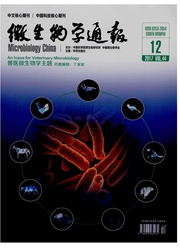

 中文摘要:
中文摘要:
【目的】制备鼠李糖乳杆菌菌毛亚基Spa A多克隆抗体,研究其种属特异性。【方法】应用PCR方法从鼠李糖乳杆菌GG的基因组扩增出spa A,并连接到质粒p ET-28α(+)中。将重组质粒转化大肠杆菌BL21(DE3),经IPTG诱导表达和镍柱纯化制备重组SpaA。通过免疫BALB/c小鼠获得多克隆抗体,利用全菌ELISA、Western和Dot-blot分析了SpaA在18株乳酸菌(12个种)中的分布特征。【结果】表达的重组SpaA分子量为36 k D,与预期大小一致;获得的Spa A抗体效价为1:12 800。Western结果显示抗体与天然Spa A具有良好的反应性。在测定的18株乳酸菌中,鼠李糖乳杆菌、干酪乳杆菌、副干酪乳杆菌3个种属菌株的spa A基因PCR和RT-PCR检测均为阳性。但全菌ELISA和Dot-blot结果显示,只有3株鼠李糖乳杆菌的全菌细胞与SpaA抗体呈特异性反应,而其它种属的菌株没有明显的交叉反应。【结论】尽管spa A基因在鼠李糖乳杆菌、干酪乳杆菌、副干酪乳杆菌中具有高度同源性,但SpaA蛋白只特异性地呈现在鼠李糖乳杆菌细胞表面。本研究中获得的Spa A抗体,为高黏附性鼠李糖乳杆菌的免疫磁珠分离及菌毛功能研究提供了工具。
 英文摘要:
英文摘要:
[Objective] To obtain the polyclonal antibody against Spa A pilin subunit from Lactobacillus rhamnosus, and study its species specificity. [Methods] The spa A of Lactobacillus rhamnosus GG(LGG) was amplified by PCR and cloned into plasmid p ET-28α(+). The resultant plasmid was transformed into Escherichia coli BL21(DE3), and the recombinant Spa A was expressed by IPTG induction and purified by Ni-NTA column. The purified protein was used to immunize the BALB/c mice for raising polyclonal antibody. The Spa A presence in 18 Lactic acid bacteria(LAB) strains belonging to 12 species was detected by indirect whole-cell ELISA, Western and Dot-blot assays. [Results] The recombinant Spa A was obtained with molecular mass of 36 k D as expected. The antibody against Spa A was generated with titer of 1:12 800. Western analysis showed that the antibody can specifically react with the native Spa A. Among 18 LAB strains, all of Lactobacillus rhamnosus, Lactobacillus casei and Lactobacillus paracasei strains showed positive reactions in the spa A-PCR and RT-PCR detection, while only 3 strains of Lactobacillus rhamnosus showed positive reactions with Spa A antibody in whole-cell ELISA and Dot-blot, and none of the other strains had obvious cross reaction with Spa A antibody. [Conclusion] Although Spa A encoding gene was highly homologous among Lactobacillus rhamnosus, Lactobacillus casei and Lactobacillus paracasei species, Spa A protein was uniquely expressed and cell surface-exposed in Lactobacillus rhamnosus. The Spa A antibody obtained in this study provide a useful tool for further immunomagnetic separation and pilin function investigation of highly adhesive Lactobacillus rhamnosus strains.
 同期刊论文项目
同期刊论文项目
 同项目期刊论文
同项目期刊论文
 期刊信息
期刊信息
